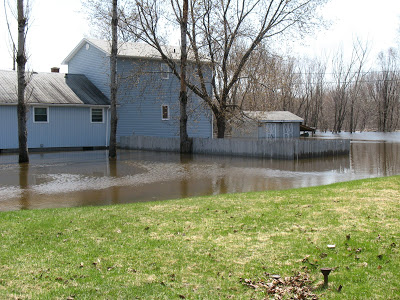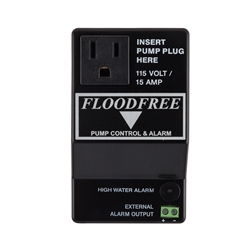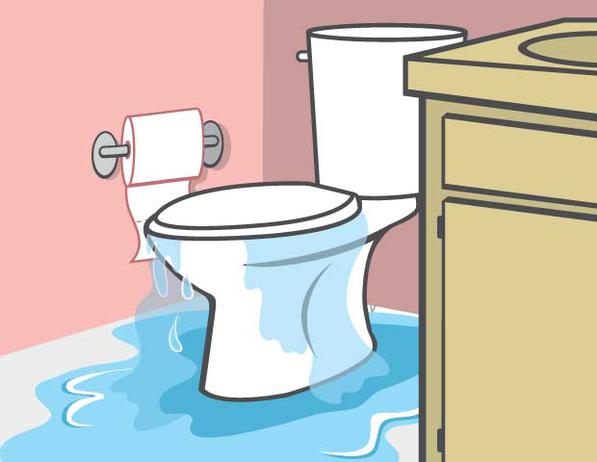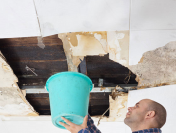If the melting snow and heavy rains of the upcoming spring thaw have you concerned about the possibilities of a wet or flooded basement, it’s time to start thinking about installing a sump pump system before the ground becomes over saturated, especially if your lot has poor drainage and the water table around the house is high.
Reasons for Wet Basements
In addition to wet weather, there are several common causes for a wet basement, such as:
- Blocked gutters
- Clogged downspouts
- Blocked sewage connections
- Cracks in the floor and walls of your basement
- Broken washing machine hoses
- Old, leaky hot water heaters.
The first step to floodproofing your home is inspect it for any of these issues and make the necessary repairs to minimize the chances of future floods.  Some of these chores, like cleaning the gutters or replacing washing machine hoses, you can easily do yourself. Other jobs may require a professional.
When Does Your Home Need a Sump Pump?
 If the water table around your home is high or your lot has poor drainage, you may need to install a floodproofing system that includes a sump pump.  Basements that flood occasionally and feel damp and smell musty probably need a sump pump. In addition to preventing a flood, a sump pump will make your basement a healthier place and protect your possessions.
If the water table around your home is high or your lot has poor drainage, you may need to install a floodproofing system that includes a sump pump.  Basements that flood occasionally and feel damp and smell musty probably need a sump pump. In addition to preventing a flood, a sump pump will make your basement a healthier place and protect your possessions.
How a Sump Pump Works
A sump pump is a small pump installed in the lowest part of a basement or crawlspace. Its job is to help keep the area under the building dry and to prevent it from floodÂÂing. Sump pumps are installed in specially constructed sump pits. Water enters the sump pit through drains or by natural water migration through the soil. The sump pump’s job is to pump the water out of the pit and away from the building so the basement or crawlspace stays dry.
Sump pumps range in horsepower and the pumping capacity varies accordingly. Generally speaking, the higher the horsepower, the more gallons per hour it will pump. ABS Robusta sump pumps, for instance, come in ¼ hp, ⅓ hp and ½ hp. A sump pump distributor or manufacturer can help you select the right size pump for your basement.
Why You Need to Alarm Your Sump Pump
 If there’s a power outage or a mechanical failure, your sump pump won’t pump and your basement will be at risk of flooding. That’s why it’s a good idea to include a sump pump alarm in your system. A sump pump alarm will warn you that sump pump is not functioning and the water level in the sump pit is rising, allowing you time to intervene before your basement floods.
If there’s a power outage or a mechanical failure, your sump pump won’t pump and your basement will be at risk of flooding. That’s why it’s a good idea to include a sump pump alarm in your system. A sump pump alarm will warn you that sump pump is not functioning and the water level in the sump pit is rising, allowing you time to intervene before your basement floods.
You can choose a “local†sump pump alarm that will sound a very loud audible alert or a “remote monitoring†sump pump alarm that will notify you by phone, email or text message.
The Floodfree FF-98 and the Reliance Controls THP205 are examples of local alarms.  A Sensaphone 400 is an example of a remote monitoring system alarm. Hook the Sensaphone up to a sump bobber (a simple float switch designed to monitor the water level in a sump pump well) and it will call you on the phone when your sump pump isn’t working.  If you don’t have a landline phone at your location or would rather receive text message alerts, the PumpAlarm Cellular Water Alarm is a very affordable alarm that communicates via a cellular connection.
ÂÂ
Next, Add Back Up Power
In addition to a sump pump alarm, a good sump pump installation will include some kind of backup plan in case the primary unit fails or if there’s a power outage. Options include a battery backup to the primary unit, a secondary battery-powered backup sump pump, or a standby emergency generator that will turn on automatically.
 Other Ways to Prevent Basement Floods
Other Ways to Prevent Basement Floods
Automatic Water Shutoff Valves — Washing machine and hot water heater leaks are the source of many basement floods. An automatic water shut off valve is an easy and affordable way to prevent water damage caused by these and other appliances. The FloodStop water leak detection device, for example, immediately turns off the hot and cold water supply to the washing machine when sensors detect a water leak.
Simple Water Alarms — A water alarm and flood sensors placed on the basement floor will alert you of water presence before extensive damage is done. There are a range of affordable, simple water alarms available that will alert you via an audible signal as well as more sophisticated alarming systems like the DIY Cellular Alarm for Homes that sends text messages to up to three cell phone numbers.
Summary
The best basement flood protection begins with eliminating potential causes around the house, like clogged gutters and cracked basement walls, and installing a sump pump system to prevent water from collecting in the basement. Automatic shut off valves, water alarms and flood sensors are your next line of defense. In just hours, a basement flood can do a lot of damage to furniture, walls, floors, appliances and furnaces, so it’s worth investing in this type of equipment to protect your home and belongings.
ÂÂ




